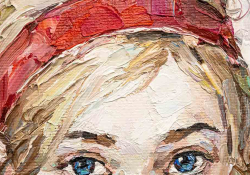The Binding of Isaac

The story of the binding of Isaac, which appears in both the Hebrew Bible (Gen. 22) and the Qur’an, remains a foundational parable of human nature. Here, Stephen Mitchell imagines five different variations on the original.
S
ometime later, God tested Abraham. “Abraham,” he said.
Abraham said, “Here I am.”
“Take your son, your darling, whom you love—Isaac—and go to the land of Moriah, and burn him there as a sacrifice on one of the hills that I will show you.”
•••
Abraham is caught in a dilemma. In parable, he must sacrifice his beloved son, even if a substitute should miraculously appear, bleating, within a thicket. In fact, however, the command is obviously demonic and he must refuse. In parable, he is a paragon of wisdom; but he is a homicidal maniac in fact.
It’s as if someone were to reach out toward the face in the mirror and, with two-dimensional silvered-glass fingers, touch warm flesh.
•••
Early in the morning Abraham saddled his donkey. He didn’t take one of the camels; he knew that the land of Moriah was harsh and mountainous and that only the smaller variety of camel, bred by the hill tribes, could manage the trip. The donkey he chose was his favorite, a four-year-old female with a docile temperament and endurance like bronze. Her hair was light gray, soft to the touch, and she had large, black, sensitive eyes that seemed to be sympathizing with him as, gently and sadly, he strapped a saddle onto her back.
He took two of his younger slaves with him, and his son, Isaac, and the wood that he had chopped for the sacrifice, and set out for the place God had spoken of. He said nothing to the child—just that they were going on a journey.
Isaac was used to his father’s silences. Few words were required between them. He could sense when Abraham was immersed in depths of contemplation that he, Isaac, could only imagine with awe. He also knew when Abraham was out of sorts, oppressed, as now, by a spiritual dilemma that demanded an immediate solution, yet could not be resolved. In either case, Isaac knew not to interrupt.
•••
Five versions of Abraham
1
It was early in the morning when Abraham arose. He had told Sarah, the night before, that God had commanded him to offer a sacrifice on a distant mountain and that he and Isaac would be gone for several days. She wasn’t to worry; he would take good care of everything that was in his power, and God would take care of the rest. He slept deeply and woke up refreshed. Then he saddled the donkey, cut the wood, and left with Isaac and the two slave boys.
Abraham didn’t know how he would be able to do this, for he loved Isaac more than his own life.
It took almost three days to reach Mount Moriah. Throughout the journey his heart was untroubled. He felt not even one moment of anxiety, because he knew to the depths of his soul that God is good. He knew that this was a test, and he was willing to undergo it to the uttermost limits of his ability: to endure the difficult journey, to set out the wood, to build the altar, to bind his beloved son and place him upon it, to reach out for the knife, to put it to the boy’s breast, and, if need be, to plunge it in as if he were slicing open the breast of a chicken. He didn’t know how he would be able to do this, for he loved Isaac more than his own life. The task was far beyond his ability to perform, and the mere thought of it made him heartsick. But God had made him a promise, and if he demanded the boy now as a holocaust, he would surely give Abraham another child afterward. Nothing was beyond His infinite power; Abraham was certain of that. The heart that was about to be irreparably broken might someday even be healed. He didn’t need to know the how or the why of it. As long as he followed the directions, he couldn’t fail.
2
It was early in the morning when Abraham arose. The voice was still sounding in his ears. “Kill Isaac!” it shouted. “Kill him! Kill him!” He saddled the donkey, cut the wood, and left with the boy and the two slaves.
Throughout the long days of the journey his terror mounted. How could God demand this of him? How could Abraham look into the child’s eyes now during the long days of the journey? And if he did manage to force himself to do the deed, what would he tell Sarah when he returned? How could he live with himself, or with Sarah’s rage and despair, if he did what was demanded of him?
The voice kept increasing in volume, and it began to threaten. If he didn’t sacrifice Isaac now, it said, the boy would suffer further torments—inconceivable, long-drawn-out, excruciating agony that Abraham would be powerless to mitigate or end. This swift sacrifice was an act of mercy, it said. It was the best thing he could do for the boy. A glorious future lay ahead, if only his faith remained firm.
When they arrived at Mount Moriah, Abraham set out the wood, built the altar, bound his beloved son and placed him upon it. He reached out and took the knife, as the voice kept screaming inside his head. He put the blade to the boy’s breast.
Then, suddenly, silence.
Abraham felt like someone who has woken from a dream. There had been no test. There had been no command. All he could hear now was the boy’s terrified whimpers and the sound of an animal bleating somewhere up the slope of the mountain.
What God had commanded was unsayable in human language; “Go” was the closest he could ever get to its meaning.
3
It was early in the morning when Abraham arose. He had spent a restless night. A long time ago, when he had first heard God’s voice, its command had been unmistakable. “Go,” it had said, and not even that. What it had commanded was unsayable in human language; “Go” was the closest he could ever get to its meaning. But yesterday the command had had words, it had contained instructions, as if a human king had told him to do such-and-such a task. He felt that he had to go, but he was uneasy about his mission. And it was not entirely up to him to say yes, after all. Isaac was Sarah’s son as well. How could he not include her in his decision? How could he proceed before gaining her consent? These doubts, and the terror of what he had been commanded to do, assailed his mind as he saddled the donkey, cut the wood, and left with Isaac and the two slaves. Perhaps it would all come clear on the journey to the place that the voice of God (if it was indeed the voice of God) would point out.
4
It was early in the morning when Abraham arose. The blood in his veins was as frigid as the water he splashed onto his face. He had never felt terror like this before. It was as if a hand had gripped his heart and was squeezing it between its pitiless fingers. He could hardly breathe. The thought of losing his beautiful child, this respectful, affectionate young boy whose eyes shone with such intelligence and delight, filled him with heartache. And that he himself was to be the cause of that death—he could not fathom it. Every time the image of the child, bound like an animal on the altar, appeared in his mind, he immediately shied away from it, wincing. He didn’t doubt God’s goodness. He didn’t doubt that he was called upon to obey His command. He didn’t doubt that if he killed Isaac, God would give him another child. But this child was the one he loved. He understood nothing, and he staggered through the preparations like a man with a fever. He saddled the donkey, cut the wood, and left with Isaac and the two slaves.
When they arrived at Mount Moriah, he set out the wood, built the altar, bound his beloved son and placed him upon it, reached out, took the knife, put it to the boy’s breast, heard the heavenly voice, put down the knife, sacrificed the ram, and returned to Beersheba. His anguish did not lift during the journey home. There was desolation in his heart. He had lost what had been most precious to him. He couldn’t even say what it was.
5
It was early in the morning when Abraham arose. When he remembered the command, he bowed his head to God’s will, as he did at every moment of prayer throughout his waking hours. The command had been clear, and he had not doubted it, nor had he doubted that he would refuse to fulfill it. If it be Your will, take the boy, he thought. I don’t know how I will endure without him, nor do I understand why you are demanding such a death of me. Nevertheless, not as I wish, but as You wish. But I will not kill him myself. All this was as clear to him as the cloudless sky.
He saddled the donkey, cut the wood, and left with Isaac and the two slaves. He would go through all the required motions, would set out the wood, build the altar, bind his beloved son and place him upon it, reach out and take the knife, put it to the boy’s breast. Then he would stop. The voice could kill him, for all he cared, but he would go no further.
•••
Abraham hasn’t been told where to go, but he trusts that his destination will be revealed to him in the very act of looking. For the first two days, as they come to place after place, the wordless question arises in his mind, and the answer is always No. He keeps his eyes alert as he rides on the donkey, with the boy clasping him from behind in his small embrace, and the two slaves walking beside them in silence.
On the third day, when he sees Mount Moriah in the distance, the question is met with a Yes that contains all the sorrow of humanity within it.
•••
Abraham said to his slaves, “You stay here with the donkey. I and the boy will go up there and worship and come back to you.” Was this a lie? He didn’t know.
Abraham took the wood for the sacrifice and put it on his son Isaac. He himself took the firestone and the knife. And the two of them walked on together.
Isaac said, “Father.”
“Yes, my son.”
“Here are the firestone and the wood. But where is the sheep for the sacrifice?”
“God will provide a sheep for the sacrifice, my son.”
And the two of them walked on together.
They came to the place that God had shown him. Abraham built an altar there. He arranged the wood, bound his son Isaac, and laid him on the altar, on top of the wood. Then he reached out and picked up the knife.
At that moment, Yahweh called to him from heaven and said, “Abraham! Abraham!”
Abraham said, “Here I am.”
Yahweh said, “Don’t lay your hand on the boy or do him any harm. Now I know how deeply you revere me, since you have not withheld your son, your darling, from me.”
Abraham looked up and saw a ram caught in a thicket by its horns. He went and took the ram and burned it as a sacrifice instead of his son. And he named that place Yahweh-yireh, Yahweh Provides.
•••
The ram has been browsing all day on the sweet grass of the mountainside when a voice whispers in his ear. “Go,” it says. “Go down the mountain to a place that I will show you.” The ram is to entangle his horns in a thicket of scrub oak and wait there for the human. Death will be swift and painless, and he will have spared the world a great grief. As for his own family, the ewes that he has won and their many lambs, they will be well cared for; they will not want for anything, and the voice will make them to lie down in green pastures and lead them beside the still waters, and all shall be well.
The ram lifts up his head, with its heavy curved horns, and sniffs the air. Then he sets out at a solemn pace down the mountain, lifting his feet gracefully, like a dancer.
Ojai, California










